WELCOME!Dr. Eileen Lacey's lab is based in the Museum of Vertebrate Zoology at UC Berkeley. The common theme that unites the lab is an interest in vertebrate social behavior and population biology. Within this general framework, research conducted by lab members covers a wide variety of taxa and topics. Field studies of behavior represent a critical component of all projects. Current research by lab members involves field work in Argentina, the Sierra Nevada of California; past work has taken place in Brazil, Panama, and Australia. We also maintain one of the only captive colonies of Colonial Tuco-tuco's Ctenomys sociabilis. Most lab members also make use of the facilities available in the MVZ's Laboratory for Evolutionary Genetics to conduct molecular analyses of parentage, kinship, or population structure. Additionally, we have partnered with other labs to conduct analyses of stress physiology and gut microbial diversity.
Our lab stands against racism and all practices that reduce equity and inclusion in the biological sciences, in academia, and in society. Our lab stands for diversity in all forms and we are committed to using our voices as scientists, as educators, and as citizens to work to remove barriers to equity. We encourage you to join us in the process of creating a different societal structure that truly includes equality for all. You can find a more in depth statement on our labs anti-racist and diversity initiatives here. Please use the links above to navigate through the site and find out more about who we are and what we do, or view the adjacent slideshow to find out more about ongoing research in the lab. |
FOR PROSPECTIVE GRADUATE STUDENTS
As part of heading toward retirement, I will not be accepting new graduate students into the lab. I've had the opportunity to work with an amazing series of doctoral students over the years, but it's time to step back and to focus on other things for the next few years. Other Berkeley faculty whose work focuses on behavior include Damian Elias, George Bentley, Chris Schell, and Annaliese Beery. I encourage you to explore their websites to see if their research aligns with your interests. -- Eileen Lacey |
Lab News

The Lacey Lab welcomes new NSF Postdoctoral fellow Nikki Lee!
August 8, 2022
We'd like to extend a warm welcome to the latest member of the Lacey Lab, Nikki Lee. Nikki is beginning an NSF funded postdoctoral project to study neuroendocrine mechanisms underlying dispersal in captive and semi-captive Tuco-tucos, as well as in wild Belding's ground squirrels.
August 8, 2022
We'd like to extend a warm welcome to the latest member of the Lacey Lab, Nikki Lee. Nikki is beginning an NSF funded postdoctoral project to study neuroendocrine mechanisms underlying dispersal in captive and semi-captive Tuco-tucos, as well as in wild Belding's ground squirrels.
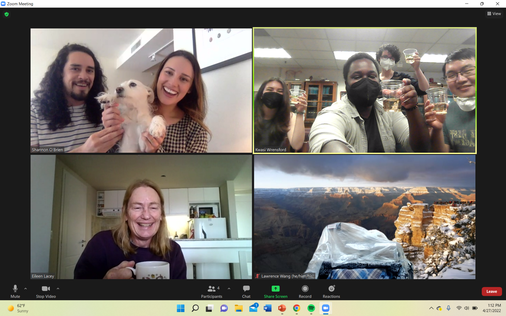
Congratulations to Dr. Shannon O'Brien for completing her PhD!
May 3, 2022
A big shoutout to Shannon O'Brien for successfully filing her dissertation entitled "Uncovering the function of group-living in a facultatively social rodent, the highland tuco-tuco (Ctenomys opimus)"! In addition, Shannon gave a virtual finishing talk mapping out her PhD journey as part of UC Berkeley's Museum of Vertebrate Zoology lunch seminar series, which can be watched here. As she finishes her PhD, Shannon is moving on to a promising career in science communication, working as a science writer for the educational web app Gaiali. To learn more, check out her new website. Congratulations Shannon, the lab will miss you!
May 3, 2022
A big shoutout to Shannon O'Brien for successfully filing her dissertation entitled "Uncovering the function of group-living in a facultatively social rodent, the highland tuco-tuco (Ctenomys opimus)"! In addition, Shannon gave a virtual finishing talk mapping out her PhD journey as part of UC Berkeley's Museum of Vertebrate Zoology lunch seminar series, which can be watched here. As she finishes her PhD, Shannon is moving on to a promising career in science communication, working as a science writer for the educational web app Gaiali. To learn more, check out her new website. Congratulations Shannon, the lab will miss you!
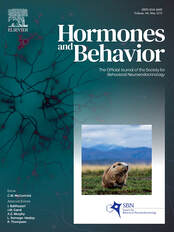
New journal article from Shannon O'Brien and Dr. Lacey in Hormones and Behavior.
May 2022
Shannon O'Brien published her work describing the relationship between sex, social behavior, and fecal glucocorticoid metabolites in Ctenomys opimus.
In addition, one of her photos of Ctenomys opimus was selected for the journal cover!
May 2022
Shannon O'Brien published her work describing the relationship between sex, social behavior, and fecal glucocorticoid metabolites in Ctenomys opimus.
In addition, one of her photos of Ctenomys opimus was selected for the journal cover!

Kwasi Wrensford awarded Ford Foundation Dissertation Fellowship
March 22, 2022
Kwasi successfully applied for the highly competitive Ford Dissertation Fellowship, securing a year of funding to focus on writing and finalizing his dissertation!
March 22, 2022
Kwasi successfully applied for the highly competitive Ford Dissertation Fellowship, securing a year of funding to focus on writing and finalizing his dissertation!

Erin Person and Kwasi Wrensford awarded UC Berkeley's Outstanding Graduate Student Instructor Award!
March 22, 2022
Both Erin and Kwasi were recognized for their exceptional efforts as educators during the previous academic year in Berkeley's Animal Behavior and Vertebrate Natural History courses respectively!
March 22, 2022
Both Erin and Kwasi were recognized for their exceptional efforts as educators during the previous academic year in Berkeley's Animal Behavior and Vertebrate Natural History courses respectively!
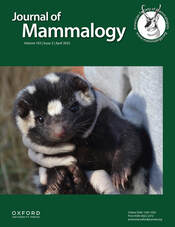
New journal article from Shannon O'Brien and Dr. Lacey in The Journal of Mammalogy.
March 2022
Along with collaborators, Eileen publishes a new paper describing variable social organization over time in Ctenomys opimus
March 2022
Along with collaborators, Eileen publishes a new paper describing variable social organization over time in Ctenomys opimus
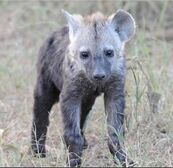
New Journal article from Erin Person in Hormones and Behavior.
November 17, 2021
Erin co-authored a new paper on her work measuring salivary cortisol levels in juvenile Spotted Hyenas.
November 17, 2021
Erin co-authored a new paper on her work measuring salivary cortisol levels in juvenile Spotted Hyenas.
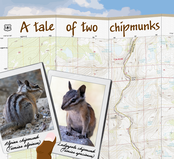
Read about Kwasi's research in the Berkeley Science Review.
May 28, 2021
Kwasi wrote and published a popular science article in the Berkeley Science Review describing his research!
May 28, 2021
Kwasi wrote and published a popular science article in the Berkeley Science Review describing his research!
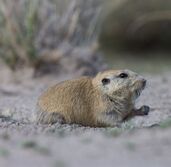
New Publication from Shannon O'Brien and Dr. Lacey in Behavioral Ecology and Sociobiology.
May 25, 2021
Shannon O'Brien publishes her work unpacking temporal and spatial variation in the Highland Tuco-tuco Ctemomys opimus.
May 25, 2021
Shannon O'Brien publishes her work unpacking temporal and spatial variation in the Highland Tuco-tuco Ctemomys opimus.
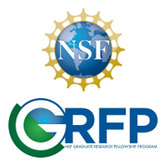
Daisy Horr, PhD Candidate and National Science Foundation Graduate Research Fellow!
May 12, 2021
Lacey Lab graduate student had quite the succesful Spring semester as she passed her Qualifying Exam with flying colors, right on the heels of receiving an NSF Graduate Research Fellowship to investigate the mechanistic and behavioral underpinnings of reproductive isolation in the California vole Microtus californicus. Congratulations Daisy!
May 12, 2021
Lacey Lab graduate student had quite the succesful Spring semester as she passed her Qualifying Exam with flying colors, right on the heels of receiving an NSF Graduate Research Fellowship to investigate the mechanistic and behavioral underpinnings of reproductive isolation in the California vole Microtus californicus. Congratulations Daisy!
The Lacey Lab Stands in Solidarity with Black Lives and Against Racism.
June 11, 2020
This spring has underscored the significant disparities that exist in our society – disparities that reflect the consistent marginalization of people of color. The disproportionate impact of COVID-19 on Black, Native American, and impoverished communities. The epidemic of police violence directed at Black people. These are two particularly salient, painful examples of a much larger, deeper, and difficult to eradicate pattern of systemic racism in the US.
Our lab stands against racism and all practices that reduce equity and inclusion in the biological sciences, in academia, and in society. Our lab stands for diversity in all forms and we are committed to using our voices as scientists, as educators, and as citizens to work to remove barriers to equity. We encourage you to join us in the process of creating a different societal structure that truly includes equality for all.
June 11, 2020
This spring has underscored the significant disparities that exist in our society – disparities that reflect the consistent marginalization of people of color. The disproportionate impact of COVID-19 on Black, Native American, and impoverished communities. The epidemic of police violence directed at Black people. These are two particularly salient, painful examples of a much larger, deeper, and difficult to eradicate pattern of systemic racism in the US.
Our lab stands against racism and all practices that reduce equity and inclusion in the biological sciences, in academia, and in society. Our lab stands for diversity in all forms and we are committed to using our voices as scientists, as educators, and as citizens to work to remove barriers to equity. We encourage you to join us in the process of creating a different societal structure that truly includes equality for all.
Kwasi Wrensford featured on WHYY's The Pulse discussing the impacts of COVID-19 on ecological field research.
May 15, 2020
Kwasi talks with a producer of the science and health program The Pulse about how COVID-19 shutdowns have impacted field research, particularly for early career scientists.
May 15, 2020
Kwasi talks with a producer of the science and health program The Pulse about how COVID-19 shutdowns have impacted field research, particularly for early career scientists.
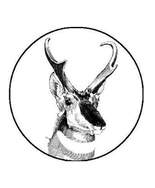
Shannon O'Brien, Erin Person, Kwasi Wrensford receive Grants-in-Aid of Research from the American Society of Mammalogists
May 5, 2020
Shannon, Erin, and Kwasi were all awarded an American Society of Mammalogists GIAR to support their dissertation research.
May 5, 2020
Shannon, Erin, and Kwasi were all awarded an American Society of Mammalogists GIAR to support their dissertation research.
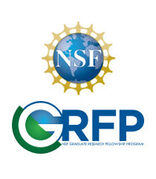
Erin Person receives an Honorable Mention for the NSF Graduate Research Fellowship Program
March 31, 2020
Erin's proposal for the NSF-GRFP was recognized with an Honorable Mention!
March 31, 2020
Erin's proposal for the NSF-GRFP was recognized with an Honorable Mention!
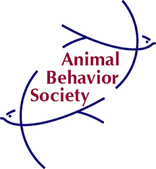
Shannon O'Brien receives a Grant-in-Aid of Research from the Animal Behavior Society
March 25, 2020
Shannon was awarded an Animal Behavior Society Research Grant for her proposal entitled Consequences of Sociality to the Gut Microbiome in a Facultatively Social Subterranean Rodent.
March 25, 2020
Shannon was awarded an Animal Behavior Society Research Grant for her proposal entitled Consequences of Sociality to the Gut Microbiome in a Facultatively Social Subterranean Rodent.
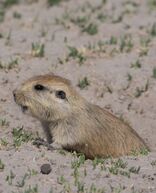
Shannon O'Brien and Dr. Lacey Publish new article in The Biological Journal of the Linnaean Society
February 18, 2020
Shannon O'Brien publishes her findings describing for the first time facultatively social behavior in the highland tuco-tuco Ctenomys opimus of Laguna de los Pozuelos, Jujuy Province, Argentina.
February 18, 2020
Shannon O'Brien publishes her findings describing for the first time facultatively social behavior in the highland tuco-tuco Ctenomys opimus of Laguna de los Pozuelos, Jujuy Province, Argentina.
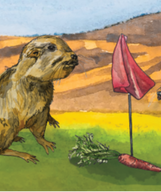
Read about Shannon's research in the Berkeley Science Review
December 4, 2019
Shannon wrote and published a popular science article in the Berkeley Science Review describing her research!
December 4, 2019
Shannon wrote and published a popular science article in the Berkeley Science Review describing her research!
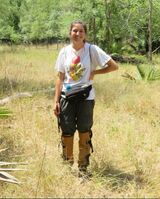
Lacey Lab welcomes new PhD student Daisy Horr!
August 21, 2019
The Lacey Lab would like to extend a warm welcome to our newest member, PhD. student Daisy Horr! Originally from Austin, Texas, Daisy did her undergraduate work at Trinity University in San Antonio, where she worked in Dr. Michele Johnson's lab studying dynamic color change in the green anole, Anolis carolinensis.
August 21, 2019
The Lacey Lab would like to extend a warm welcome to our newest member, PhD. student Daisy Horr! Originally from Austin, Texas, Daisy did her undergraduate work at Trinity University in San Antonio, where she worked in Dr. Michele Johnson's lab studying dynamic color change in the green anole, Anolis carolinensis.
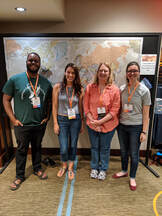
Lacey Lab takes Washington DC for the American Society of Mammalogists Centennial Meeting
July 2, 2019
The American Society of Mammalogists just held their 99th annual meeting in Washington DC, marking 100 years since the organization's founding. Eileen, a former president of ASM, gave a talk on the role paleoenvironmental change may have played in the loss of genetic diversity in Colonial Tuco-tucos, in addition to presiding over several events during the meeting. Shannon, Kwasi, and Erin all presented posters on their research as well.
July 2, 2019
The American Society of Mammalogists just held their 99th annual meeting in Washington DC, marking 100 years since the organization's founding. Eileen, a former president of ASM, gave a talk on the role paleoenvironmental change may have played in the loss of genetic diversity in Colonial Tuco-tucos, in addition to presiding over several events during the meeting. Shannon, Kwasi, and Erin all presented posters on their research as well.
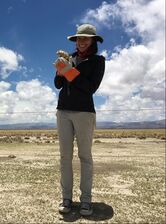
Shannon O'Brien receives a Ford Foundation Pre-Doctoral Fellowship
March 15, 2019
PhD candidate Shannon O'Brien was just awarded a Ford Foundation PreDoctoral Fellowship in support of her dissertation project on the social behavior, stress physiology, and gut microbial diversity of the highland tuco tuco, Ctenomys opimus. The Ford Foundation Fellowship supports researchers at various stages of their career who have demonstrated a clear dedication and passion for education, diversity, equity, and inclusion. Congrats Shannon!
March 15, 2019
PhD candidate Shannon O'Brien was just awarded a Ford Foundation PreDoctoral Fellowship in support of her dissertation project on the social behavior, stress physiology, and gut microbial diversity of the highland tuco tuco, Ctenomys opimus. The Ford Foundation Fellowship supports researchers at various stages of their career who have demonstrated a clear dedication and passion for education, diversity, equity, and inclusion. Congrats Shannon!
